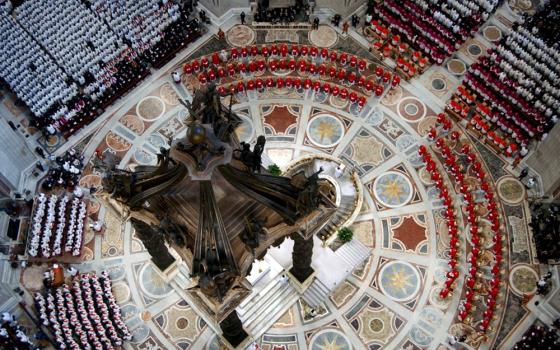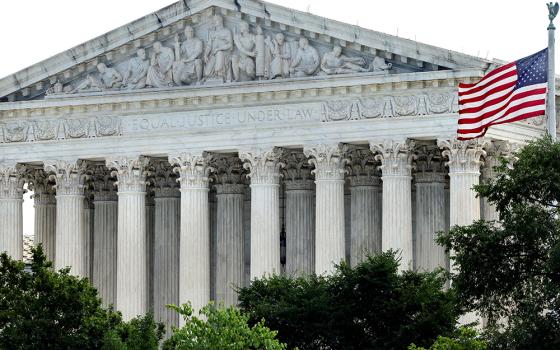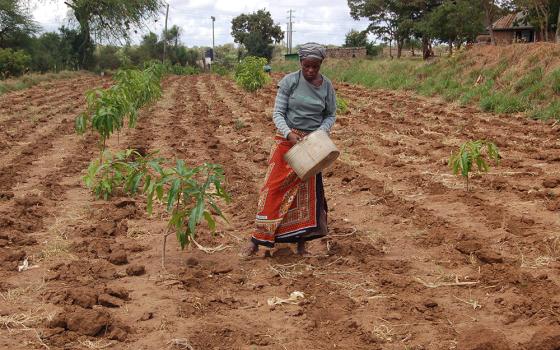Irish Columban missionary Fr. Sean McDonagh send this report from Copenhagen on Thursday, Dec. 17:
"There was a heavy fall of snow here in Roskilde (40 minutes by train from Copenhagen) last night. A blast of freezing air hit me when I opened the door of the Franciscan house to walk to the train station. That journey normally takes about 15 minutes. It took almost took twice as long today, as the underfoot conditions are treacherous. I nearly came to grief on a slope leading up to the station.
When I finally boarded the train, I chose a quiet carriage and thought immediately how aptly the weather reflects the mood in the Bella Center, where COP 15 is taking place. (Here in Copenhagen some carriages on each train are reserved for those who wish to travel in silence, with no loud music playing or no loud conversations on mobile phones.) To put it in a nut shell, trust seems to have collapsed on many fronts here during the past 10 days.
Though the scientific community is almost unanimous about the reality of climate change impoverishing the global community, negotiators here are placing the political or economic advantage of their own country ahead of the well-being of the planet and future generations. In addition, everyone seems to be looking for banana skins in texts that might be seen to disadvantage their own country, while being oblivious to what is needed here, namely a fair, ambitious and legally binding treaty to ensure that average global temperatures do not exceed 2 degrees Celsius.
Trust has also broken down between the authorities at the UNFCCC and representatives of civil society (NGOs). Since the weekend, when the authorities began seriously restricting entry for NGO representatives, it was obvious that trouble was brewing. There is a feeling that those who shouted loudest against being excluded were treated more harshly than others. Earlier in the day, several major accredited environmental groups, including Friends of the Earth, Avaaz and TckTckTck, were refused entry to the conference. Ironically one the people denied access to the summit was Stuart Eizenstat, the U.S. chief negotiator at Kyoto.
On Dec. 16, more than 4,000 people marched on the Bella Center to protest their exclusion. The Danish police arrested more than 250 people, handcuffed them and put them in cages of 10, 15, 20 or 25 persons each. The police also used dogs to control the crowd.
Tim Jones, policy officer for anti-poverty campaigners the World Development Movement, told John Vidal of The Guardian newspaper that: 'Today thousands of people sought to create a people’s assembly to get voices heard offering real solutions to the climate crisis. The people’s assembly was stopped by police who committed unprovoked violence on both protesters and official delegates to the U.N. negotiations. This is a moment in history where the right to protest is of vital importance.'
At the same time NGO representatives inside the Bella Center staged a noisy walkout to protest the exclusion of their members. Their banners read 'Reclaim power' and 'Climate justice now.' Tom Goldtooth, a Bolivian with the Indigenous Environmental Network, led the chanting and drumming. 'We feel they are negotiating for the sake of corporations,' he said. There was a heated exchange between the protestors and Yvo de Boer, the head of the U.N.’s climate change secretariat.
When the chants became personal he claimed that, 'I’m stuck between a rock and hard place.' He went on to challenge the protestors, 'Do you want to talk to me or do you want to fight me?' Many of you may have witnessed this interaction as it was shown on many tv channels.
I got a text message at about 2 p.m. from Fr. John Leydon, parish priest of Malate Parish in Manila, who is the other Columban present here in Copenhagen. It read, 'Hi, nearly got arrested in the walk out. Reckon I’m finished with the Bella Center. Good luck on the inside.'
I was reminded of marches during the Marcos dictatorship. The difference between now and then is that there were no mobile phones or digital camera, so the protestors were much more vulnerable. As the walkout was being organised, I was heading for the daily briefing and strategy meeting of Climate Action International (CAN). At that meeting, I learned that only those who secure a third card would be eligible for entry on Thursday. I knew that my time on the inside was also up.
So much for the drama, but little progress has been made on the substantive issues of reaching a fair, ambitious and legally binding treaty here in Copenhagen. All that is on the table in terms of the negotiations, as of this morning, are weak texts.
It appears that the more than 200 heads of state who are arriving both today and tomorrow had expected to have generally agreed documents, with only a few points left to clarify. Many of them may not get here for hours and may be in a foul mood, if weather conditions worsen. Planes are being diverted to airports in Sweden and the southern part of Denmark. When they get here they are going to have to work long hours today and tomorrow to reach a viable agreement. What are the chances of this happening? At this point I would have to say, slim indeed. But miracles do happen!




